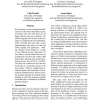Free Online Productivity Tools
i2Speak
i2Symbol
i2OCR
iTex2Img
iWeb2Print
iWeb2Shot
i2Type
iPdf2Split
iPdf2Merge
i2Bopomofo
i2Arabic
i2Style
i2Image
i2PDF
iLatex2Rtf
Sci2ools
COLING
2010
2010
Informed ways of improving data-driven dependency parsing for German
We investigate a series of targeted modifications to a data-driven dependency parser of German and show that these can be highly effective even for a relatively well studied language like German if they are made on a (linguistically and methodologically) informed basis and with a parser implementation that allows for fast and robust training and application. Making relatively small changes to a range of very different system components, we were able to increase labeled accuracy on a standard test set (from the CoNLL 2009 shared task), ignoring gold standard partof-speech tags, from 87.64% to 89.40%. The study was conducted in less than five weeks and as a secondary project of all four authors. Effective modifications include the quality and combination of autoassigned morphosyntactic features entering machine learning, the internal feature handling as well as the inclusion of global constraints and a combination of different parsing strategies.
COLING 2010 | Computational Linguistics | Data-driven Dependency Parser | Features Entering Machine | Standard Partof-speech Tags |
Related Content
| Added | 13 May 2011 |
| Updated | 13 May 2011 |
| Type | Journal |
| Year | 2010 |
| Where | COLING |
| Authors | Wolfgang Seeker, Bernd Bohnet, Lilja Øvrelid, Jonas Kuhn |
Comments (0)

